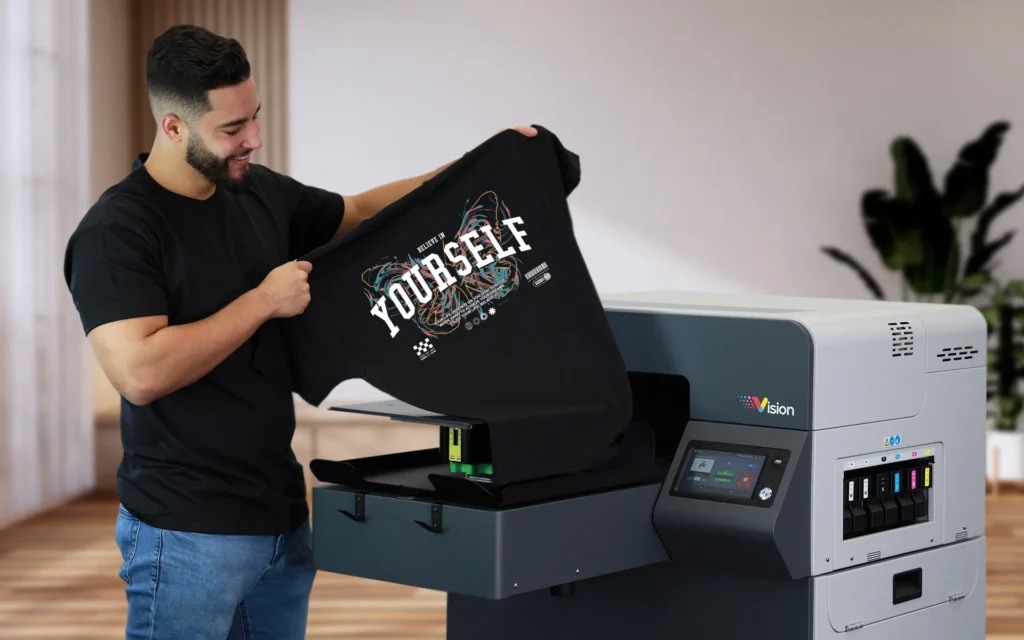T-shirt printing has evolved from a small-scale hobby to a major industry that offers vast opportunities for creative expression, business growth, and personalization. Whether you’re designing unique apparel for personal use or looking to launch a custom merchandise business, a t-shirt printer can be a game-changer. In this article, we’ll explore what t-shirt printers are, the different types available tshirt printer, their uses, and how to choose the right one for your needs.
What is a T-Shirt Printer?
A t-shirt printer is a specialized machine designed to transfer custom designs onto fabric. These machines use various printing technologies, such as inkjet, screen printing, or direct-to-garment (DTG) printing, to create high-quality, durable prints on t-shirts and other apparel. T-shirt printers come in a range of sizes, capabilities, and price points, from compact desktop models to large-scale industrial machines.
Types of T-Shirt Printers
-
Screen Printing Machines
-
Overview: Screen printing is one of the oldest and most popular methods for mass-producing t-shirt designs. This process involves creating a stencil (or screen) of the design and then using it to apply layers of ink onto the t-shirt. Each color in the design requires a separate screen.
-
Pros: Screen printing is ideal for large orders, offers vibrant colors, and provides a durable finish.
-
Cons: Setup costs can be high, and the process can be time-consuming for smaller runs or complex designs.
-
-
Direct-to-Garment (DTG) Printers
-
Overview: DTG printers use inkjet technology to print designs directly onto t-shirts. This method allows for detailed, full-color designs, including gradients and complex images, making it ideal for custom and one-off prints.
-
Pros: DTG printing is perfect for small orders, offers high-quality results, and doesn’t require screens or stencils.
-
Cons: While DTG printing can produce vibrant colors, it may not be as cost-effective for large runs as screen printing.
-
-
Heat Transfer Printing
-
Overview: Heat transfer printers work by printing a design onto a transfer paper and then using heat to transfer the design onto the t-shirt. This method can be used for both small runs and full-color designs.
-
Pros: Heat transfer printing is a great option for intricate designs and works well for small batches.
-
Cons: The durability of heat transfer prints may be less than that of screen-printed or DTG prints, especially after multiple washes.
-
-
Sublimation Printers
-
Overview: Sublimation printing involves turning dye into gas and then bonding it with polyester fabrics. This process is only compatible with synthetic fabrics like polyester and works well for all-over prints.
-
Pros: Sublimation produces vibrant, long-lasting designs, especially on light-colored garments.
-
Cons: It can only be used with synthetic fabrics, limiting the material options.
-
How Does T-Shirt Printing Work?
The process of t-shirt printing can vary depending on the type of printer, but generally follows these steps:
-
Design Creation: The first step is to create or obtain the design. Graphic design software like Adobe Illustrator or Photoshop is often used to create custom artwork.
-
Preparation: The printer is prepared based on the printing method. For example, screen printing requires making stencils, while DTG printers need to load the design into the printer’s software.
-
Printing: The design is applied to the t-shirt using the chosen method. In the case of screen printing, ink is pushed through the mesh screen onto the fabric. With DTG, ink is sprayed directly onto the fabric.
-
Curing or Drying: After printing, the ink needs to be cured or dried. This process ensures that the design is set and will last through washing and wear.
-
Quality Check: Finally, the printed t-shirts undergo a quality check to ensure that the design is clear, vibrant, and free from any defects.
Benefits of Owning a T-Shirt Printer
-
Customization: One of the biggest advantages of using a t-shirt printer is the ability to create custom designs. Whether for personal use, a small business, or promotional items, you can create unique apparel that fits your specific vision.
-
Business Potential: T-shirt printing is a booming business. If you’re interested in starting your own custom apparel business, owning a t-shirt printer allows you to produce products in-house, which can save money on outsourcing.
-
Low Investment with High Returns: With advances in technology, many t-shirt printers are now more affordable, making it easier for individuals or small businesses to start printing their own t-shirts. With a small initial investment, you can start producing and selling custom t-shirts and other apparel.
-
Creative Freedom: T-shirt printing offers virtually unlimited creative possibilities. From graphic designs to intricate patterns, you can use your printer to create any design you can imagine, without limits.
How to Choose the Right T-Shirt Printer
Selecting the right t-shirt printer depends on several factors:
-
Volume of Production: If you’re planning on printing large quantities of t-shirts, a screen printing machine might be your best option. However, if you’re focusing on smaller runs or individual prints, a DTG or heat transfer printer may be more cost-effective.
-
Print Quality: Different printers offer varying print qualities. If you’re looking for the highest level of detail and color accuracy, a DTG printer is ideal. For bulk production with simple designs, screen printing might be sufficient.
-
Budget: T-shirt printers come in a wide range of prices. While screen printers and industrial DTG machines can be expensive, there are also affordable desktop models that can still produce high-quality prints.
-
Fabric Compatibility: If you’re printing on cotton t-shirts, a DTG or screen printer is suitable. However, if you want to print on synthetic fabrics like polyester, sublimation printing is your best option.
-
Ease of Use: Some t-shirt printers are more beginner-friendly than others. If you’re new to printing, look for a model that’s easy to set up and operate. Many modern printers also come with user-friendly software.
Conclusion
T-shirt printers are an invaluable tool for anyone interested in custom apparel. Whether you’re creating designs for personal use, launching a business, or producing promotional materials, the right printer can make all the difference.


